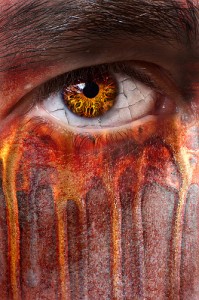
Most people who are interested in learning more about their dreams are women. Whether it’s culture or biological, women seem to be more willing to explore the murky murk of their dreamworld as well as share their dreams with others.
Why are most men not interested in their dreams? Probably because working with dreams is an emotional process. And, in this society of course, men are trained to remain as far from their emotions and intuitions as possible.
I’m one of the lucky ones, a man who arrived in adulthood with my emotional life still intact. I thank my upbringing for that, especially a father who taught me that it’s okay to cry sometimes and that being a man isn’t just about taking out the garbage and changing the oil, but also having compassion and respect for the people in your life. And most importantly, being a man is knowing what is most important to you and acting from those values every day.
Dreamwork has deepened this process for me, and I’m certain it plays a major role in the ongoing “unfreezing process” of the Western Man.

Emotions and Masculine Vitality
Case-in-point: the dreamwork method of acting recently publicized in the New York Times, raved about by actors Harvey Keitel and Keith Nobbs. These men use their dreams to access a character’s “inner world.” Freud was wrong about a lot of things, but dreams are still the “royal road” to emotionally-charged memories in our lives.
I’ve seen first hand how men are transformed by their dreams, which show them the way to becoming more fulfilled in life and more effective in their work. Working with dreams is one of the quickest way for men to reclaim vitality. The good news is that learning how to recall more dreams is not too difficult once you set the intention and add some good habits to your sleeplife.
The value of understanding emotional triggers as a man is priceless: we become more in charge of our destiny, recognize when we are being irrational, and become more intuitive in the moment. That means making quick leadership decisions on-the-fly, as well as understanding the people in our lives better than ever.
And let me add: men who understand their emotions and the emotions of others are men who have active and satisfying sex lives.
Lucid Dreaming and the Warrior Spirit
 Interestingly, a reversal of the fact that most dreamers are women is lucid dreaming, or dreams in which you know that you are dreaming. Men make up about three quarters of lucid dreaming enthusiasts. (Not that men are better at lucid dreaming, by the way! Rather, men show up more to learn lucid dreaming; there are many more lucid women, due no doubt to trends I’ve already outlined). Over the years, I’ve heard some derisive gender stereotypes about this, such as, “Of course men are into lucid dreaming; it’s all about dream control!”
Interestingly, a reversal of the fact that most dreamers are women is lucid dreaming, or dreams in which you know that you are dreaming. Men make up about three quarters of lucid dreaming enthusiasts. (Not that men are better at lucid dreaming, by the way! Rather, men show up more to learn lucid dreaming; there are many more lucid women, due no doubt to trends I’ve already outlined). Over the years, I’ve heard some derisive gender stereotypes about this, such as, “Of course men are into lucid dreaming; it’s all about dream control!”
Hogwash. While I know that many men are interested in becoming lucid so they can live out their dream fantasies (just like women do when first learning how to have a lucid dream), I think something deeper is going on here. Lucid dreaming is about mastering self-control, not dream domination. It requires strong willpower and an active desire to forge a new path.
Lucid dreaming is a masculine pursuit not because men “want to control the dreamworld like they control everything else” but because the practice embodies what traditionally was called masculine power: it’s focused, goal-driven, confrontational, and fearless.
No matter your gender, lucid dreaming demands a warrior spirit and a yang temperment.
In this age that seems to only give men two options: being a sensitive new-age guy who is too soft to disagree with, or an emotionally-bereft macho man out to dominate the world, dreamwork offers a third path to masculinity: to know who you are, where you came from, and where you’re going.
In other words, to be a Dreamer.
With Father’s Day coming up, I dedicate this post to my dad, the bravest man I know.
I completely agree. I notice the male friends in my life are more likely to avoid the topic than females. It’s almost as if they have a secret that they feel will be accidentally shared if they share a dream. Women on the other hand seem to really enjoy sharing a dream – as if to get something out in the open, something they’ve been wanting to say for awhile. I guess that is why women are more likely to want to watch a sad movie than men – expression of emotion.
Interesting article. Quick question: where do you get your information that women are more interested in dreams than men by a margin of 80 percent to 20 percent; and that men are more interested in women in lucid dreaming by a margin of 75 percent to 25 percent?
Thanks. And good to see an article encouraging men to use dreams to access and integrate the many dimensions of oneself that arise in the dreamworld.
Hey David – thanks for coming by – those numbers are very unscientific actually. They are based on my years of giving dream talks, attending workshops, etc and noticing who shows up. (I’m going to edit the post to reflect that and prevent further confusion). thanks for keeping me honest.
And, it was Robert Waggoner who commented to me recently that when he does a talk on lucid dreaming, the only people who raise their hand when he asks “who has had more than 100 lucid dreams” are YOUNG men. (the older men… not in the room).
What an interesting perspective! I’ve never thought about gender in that way. I agree that in my experience, most lucid dreamers are men, though I’d say it’s more of a 60/40% split and I, a woman, have had more than 100 lucid dreams.
I remember an interview with Steve Kilbey, singer and bassist of the Church, in which an interviewer asked why he thought more men were technically great guitarists, while women tended to do simple strumming as a secondary component to singing. He said something like, “I think it’s because more young men have that insane drive to spend hours on hours practicing one thing to the exclusion of all else, which is what it takes to reach that level of proficiency. Women are more practical than that.”
I wonder if this could also apply to lucid dreaming, a skill that takes a lot of cultivating for most people.
thanks for the feedback KMG. I don’t mean to suggest that women can’t be lucid dreamers – some of the most powerful lucid dreamers I know are women (pasQuale, Beverly D’Urso, Jayne Gackenbach, Fariba Bogzaran, and you KMG of course, the list goes on).